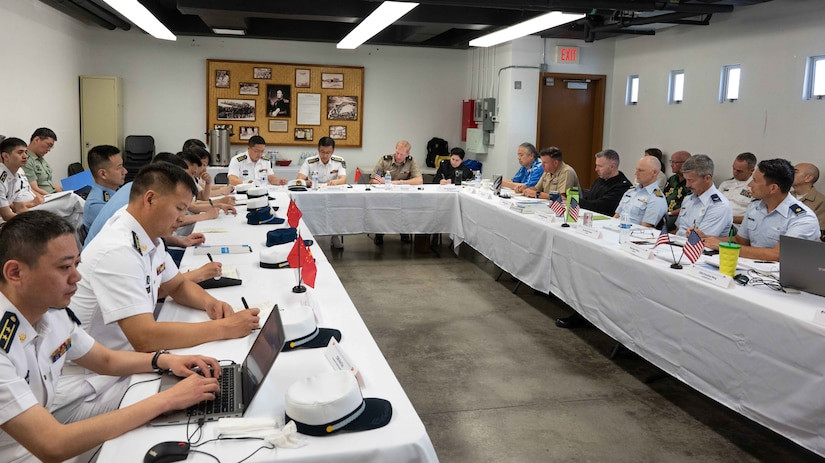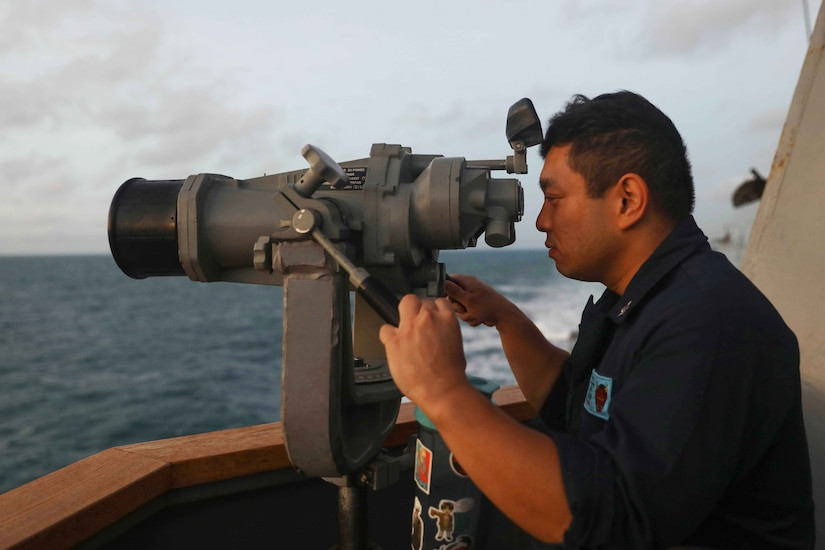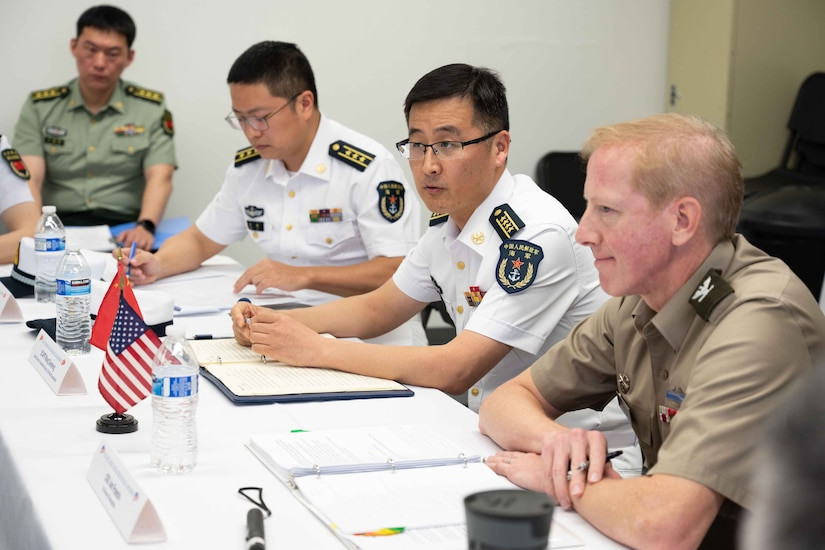Military officials from the United States and China convened this week for crucial working-level discussions focused on bolstering air and naval safety protocols between their respective forces. The talks signify a re-engagement in direct communication aimed at preventing misunderstandings and ensuring professional interactions in increasingly contested maritime and airspaces.
The Military Maritime Consultative Agreement Working Group (MMCA) meeting, held in Honolulu, marked the resumption of annual operational safety dialogues that had been paused since December 2021. Established over two decades ago, the MMCA serves as a vital platform for U.S. Indo-Pacific Command to engage directly with the People’s Liberation Army (PLA) on matters of maritime and aviation safety.
 US and Chinese military representatives in a formal meeting setting, discussing maritime safety protocols.
US and Chinese military representatives in a formal meeting setting, discussing maritime safety protocols.
This year’s discussions brought together representatives from key U.S. commands, including U.S. Indo-Pacific Command, U.S. Pacific Fleet, and U.S. Pacific Air Forces, who met with their counterparts from the Chinese PLA. Colonel Ian Francis, Indo-Pacom’s director of Northeast Asia policy and head of the U.S. delegation, expressed optimism regarding China’s commitment to the dialogue. He emphasized the importance of these talks for safeguarding military personnel operating in the region.
“The Military Maritime Consultative Agreement is U.S. Indo-Pacom’s primary means to directly discuss air and maritime operational safety with the PLA,” Col. Francis stated. He underscored the U.S.’s dedication to operating safely and professionally in the Indo-Pacific, within the bounds of international law. “Open, direct and clear communications with the PLA and with all other military forces in the region is of utmost importance to avoid accidents and miscommunication,” he added, highlighting the critical role of these dialogues in preventing unintended escalations.
During the MMCA discussions, officials from both nations reviewed specific safety-related incidents that have occurred in recent years, analyzing the circumstances and exploring preventative measures. They engaged in discussions focused on maintaining operational safety and professionalism in both maritime and aviation domains, seeking to establish common ground and enhance mutual understanding of operational norms.
 US Navy officer on deck of vessel, observing maritime activity with binoculars, ensuring safe navigation in the Taiwan Strait.
US Navy officer on deck of vessel, observing maritime activity with binoculars, ensuring safe navigation in the Taiwan Strait.
The resumption of these military-to-military talks follows a significant meeting between President Joe Biden and Chinese President Xi Jinping in November, during the Asia-Pacific Economic Cooperation forum. President Biden secured China’s agreement to re-engage in military dialogues, recognizing the necessity of communication channels to manage tensions. This was further solidified by subsequent talks between Chairman of the Joint Chiefs of Staff Air Force Gen. CQ Brown, Jr., and his PLA counterpart, Gen. Liu Zhenli, in December, and the U.S.-China Defense Policy Coordination Talks at the Pentagon in January.
Despite these positive steps towards communication, the U.S. remains vigilant regarding concerning trends in the region. The U.S. Department of Defense’s recent China Military Power Report highlighted over 180 instances of coercive and risky air intercepts against U.S. aircraft by China between 2021 and 2023, a significant increase compared to the previous decade.
However, in previewing this week’s MMCA talks, defense officials acknowledged a recent decrease in unsafe behavior from China towards U.S. maritime and air operations. “We’ve observed a reduction in unsafe behavior between us and PLA aircraft and vessels over the last several months,” a senior military official noted. “So, we’re encouraged by that, and we’re happy that we have this opportunity with the MMCA to talk about ways to make sure that trend continues in the right direction.” This positive trend underscores the importance of sustained dialogue and the potential for improved interactions through continued communication.
 Meeting of US and Chinese military delegations at a conference table, focused on de-escalation and military cooperation in the Pacific.
Meeting of US and Chinese military delegations at a conference table, focused on de-escalation and military cooperation in the Pacific.
Nevertheless, U.S. officials expressed ongoing concerns about China’s actions towards other nations’ maritime operations in the region, particularly in the South China Sea. “In recent months, we do continue to see the PRC acting very dangerously and unlawfully against routine maritime operations the Philippines was conducting in the South China Sea,” a senior defense official stated, indicating that these issues remain a point of contention and will continue to be addressed in diplomatic and military engagements.
The recent phone discussion between Presidents Biden and Xi further emphasized the commitment to maintaining open communication channels. Both leaders engaged in “candid and constructive discussion” on various bilateral, regional, and global matters, reaffirming the importance of managing the complex relationship through continued dialogue and working-level engagements like the MMCA. The focus remains on fostering stability, preventing miscalculations, and ensuring safe and professional interactions between the two militaries operating in close proximity.
